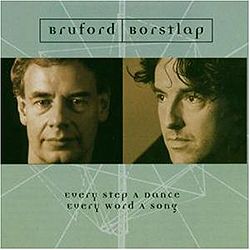November 2005
Bruford / Borstlap: Every Step A Dance, Every Word A Song
05/11/05 08:47

I first saw the duo of British drummer Bill Bruford and Swiss keyboardist Patrick Moraz in 1982, at New York City's now defunct Bottom Line, and later in 1983, at D.C.'s now defunct Bayou. Bruford and Moraz had released two albums, the acoustic "Music for Piano and Drums", and the electronic "Flags". Consequently, these recordings and others have been reissued on Bruford's new record labels: Summerfold and Winterfold. Now, on this new CD, "Every Step A Dance, Every Word A Song", and a DVD titled "In Concert In Holland", Bruford this time teams up with Dutch keyboard master Michiel Borstlap, in duets culled from their 2003-2004 European tour. Although the duo's efforts are rooted in jazz, there are hints of the progressive-rock/New Age flavor of "Flags", where Borstlap employs synthesizer for choruses and textures, and Bruford's well known polyrhythmic beats and syncopations that propel this beautiful musical journey.
The "Left of the Dial" reviewer Glenn Astarita, notes that "Borstlap primarily uses a grand piano as his instrument of choice via a potpourri of swing vamps, and sublime moments, while Bruford's shading exercises, add color and additional warmth. Highlights include segments where the duo expands themes and unexpectedly switch gears as they often instill a polytonal outlook during jazz standards such as Monk's "Bemsha Swing," for example.
The piece titled "Swansong," is a compelling opus that defines the artists' overriding sense of musical intimacy coupled with power and tenacity. Here, Borstlap executes slashing crescendos amid Art Tatum-like chord voicings, as the unit melds quaint balladry with bluesy passages. The fun factor continues with Bruford's drumming onslaught, which serves as a prelude of sorts, to Borstlap's shrewd use of a synth chorale voicing to finalize the piece. Simply stated, it's about synergy and singular techniques rooted with elements of joy and precision.
Bruford met Dutch pianist Michiel Borstlap in 2002, and they began playing duo shows that were less about the confines of structure and more about what Bruford terms "performance-based" music, music of the moment where spontaneity and interaction were the predominant factors.
Canadian Music reviewer John Kelman wrote that "while Bruford and Borstlap are still more concerned with form than, say, Italian pianist Enrico Pieranunzi-whose recent album with Paul Motian, Doorways , is another beast entirely-the reciprocation between the two jumps out from the first notes of the more structured "The 16 Kingdoms of the 5 Barbarians." Bruford's liner notes allude to the fact that the performance space impacts the nature of the musical dialogue-smaller rooms having "the intimacy of a dinner table conversation between old friends," while larger venues "naturally become a bit more muscular and assertive."
Still, on more introspective pieces including the title track, the anthem-like "Inhaling Shade," and an abstract, yet faithful reading of Monk's "Round Midnight," Bruford may gently assert the forward motion, but he's also become a masterful colourist. And while Borstlap's supplementing of his piano with electronic keyboards sometimes gives the duo a broader complexion, the subtleties of their exchange are never overshadowed by sheer demonstrativeness.
Every Step a Dance, Every Word a Song may not be as great a step forward for Borstlap, already a well-established European jazz figure, but it represents one more advance in the pursuit of a more instinctive and natural approach for Bruford, an artist who has, for all intents and purposes, left his rock roots completely behind him.